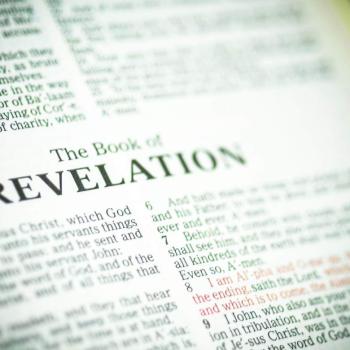
The other day, I watched the Netflix original film “Come Sunday,” which chronicles Bishop Carlton Pearson’s deconstruction out of Infernalism (the doctrine that states some humans will burn in hell for all eternity). My goal in this piece is not to offer a review or to drop spoiler bombs on y’all. (Just go watch the film. It’s great.) Rather, I wanted to discuss one specific thing that happened in the film and talk about why it annoyed me so much.
As many of us can imagine, after Bishop Pearson announced that he no longer believed in hell, the charges of heresy began to fly. No surprise here, amiright? But what struck me as odd is that some folks in Pearson’s life wanted to use Romans 10:9 as a prooftext that hell is a reality and that many will one day find themselves consigned there. They could have used so many others, but they chose this one. The verse reads:
“Because if you confess with your lips that Jesus is Lord and believe in your heart that God raised him from the dead, you will be saved.”
Of course, this raises the questions: Saved from what? And saved for what? But that’s probably a topic for another time. In this piece, I wanted to focus on the first clause in this verse, the one that says one must confess Jesus as Lord and believe that he was raised from the dead in order to be saved. Hopefully by the end of this post, then, we’ll see why it is absurd to suggest that this verse argues that some will be forever lost to the flames of hell.
To begin, let’s jump forward to chapter 14 of Paul’s letter to the Romans. In verse 11, the Apostle writes:
“As I live, says the Lord, every knee shall bow to me, and every tongue shall give praise to God.”
This same thing is also repeated in Philippians 2:9–11, which reads:
“Therefore God also highly exalted him and gave him the name that is above every name, so that at the name of Jesus every knee should bend, in heaven and on earth and under the earth, and every tongue should confess that Jesus Chris is Lord, to the glory of God the Father.”
That’s fairly straight forward, right? While Paul says everyone must confess that Jesus is Lord in order to be saved (Romans 10:9), he also seems to think everyone will do this (Romans 14:11).
Now, here’s where things get messy. Many Christians will still be inclined to argue that while everyone will declare Jesus as Lord, not all will be saved because for many, it will be too late. In other words, once everyone makes this declaration, God will still toss many aside due to the fact that some are bowing their knees as if defeated soldiers on a battlefield. But is that what Paul is really saying?
To answer, let’s jump over to his first letter to the Corinthians. In chapter 12, verse 3, Paul writes:
“Therefore I want you to understand that no one speaking by the Spirit of God ever says ‘Let Jesus be cursed!’ and no one can say ‘Jesus is Lord’ except by the Holy Spirit.”
Did you catch that? According to Paul, in order to declare Jesus as Lord, one must be speaking through the power of the Holy Spirit. Which raises the question: Won’t the very same “all” that Paul speaks of in Romans 14:11 and Philippians 2:9–11 be speaking by the Spirit of God when they declare “Jesus is Lord?” How could it be otherwise? And why would God then still toss them aside? That would make no sense, unless God is some sort of sadistic monster (which many seem to think he is).
I really can’t quite understand why so many Christians fail to grasp this. If Christians were honest, I bet they’d admit that they did nothing in order to be saved. Even those who argue for libertarian free will would probably admit that it was, first and foremost, the Holy Spirit that compelled them to confess Jesus as Lord. Why wouldn’t the same be true for those whom they say will still be thrown into the pits of hell?
Why?
Now, I know I could dig deeper, but this isn’t the place for such dense exegetical work. Instead, I’ll simply close with this: If we say that God is a God of love—that God IS love in fact—then we must never say that God is coercive. Compelling, sure. But not coercive. To that end, when it comes to bowing to Jesus and making the declaration that he is Lord, we must say that those who do this are not coerced, but compelled. Hence, they are not to be thought of as a legion of soldiers who begrudgingly bow to Jesus—as if we are supposed to be preaching the gospel according to Caesar—but as a great multitude of brothers and sisters who have finally come to the realization that the merciful Lamb of God is Lord over all.
Again, it’s compelling but not coercive. Praise be unto God for that!
Until next time.
*If you want to hear our interview with Bishop Carlton Pearson, subscribe to the Heretic Happy Hour podcast on iTunes, or follow us on Podbean. And, to get a sneak peak of our chat with Pearson, become a monthly supporter on Patreon, where you can unlock this and lots of other extra goodies.













